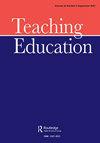Staying with difficulty: on the emotional and social uses of childhood objects in unbecoming a teacher
IF 1.1
Q2 EDUCATION & EDUCATIONAL RESEARCH
引用次数: 0
Abstract
ABSTRACTThis article examines how five teacher candidates conceptualized meanings of teaching and childhood through discussions of childhood objects within a focus group. Drawing on psychosocial methods, we show how teachers used their objects to work through tensions between professional roles as educators and the return of personal memory. We highlight the ways in which meanings of teaching and childhood were affected by the shifting dynamics of compliance, anxiety, and conflict within the group. Through our analysis, we illustrate the value of using objects to support emerging teachers’ engagements in complicated conversations within a divergent community to represent conflictive meanings of childhood and education.KEYWORDS: Teacher educationcurriculum theorypsychosocial methodsfocus groupschildhood objectsmemory Disclosure statementNo potential conflict of interest was reported by the author(s).Notes1. This research was approved by York University’s Human Participants Research Review Committee.2. Earlier findings examined the pedagogical significance of childhood memories of nuisance-making leading to school surveillance (Farley et al., Citation2020), the colonial construct of innocence (Garlen, Chang-Kredl, Farley & Sonu, Citation2021), the relationship between memories of parental care and empathy (Chang-Kredl et al., Citation2021), and childhood memories of injustice and illness as catalysts for teachers’ dreams for just futures and pedagogical practice (Sonu et al., Citation2020, Citation2022). The second phase of research surfaced the role of nostalgia in teachers’ understandings of childhood under Covid-19 (Farley et al., Citation2022) and the meaning of childhood agency in oppressive contexts of schooling (Garlen et al., Citation2022).3. Webkinz are a stuffed animal franchise with interactive online counterparts (GANZ, Citation2012).Additional informationFundingThis work was supported by the Social Sciences and Humanities Research Council.与困难共处:论不成为教师时儿童物品的情感和社会用途
摘要本文考察了五位教师候选人如何在焦点小组中通过对童年对象的讨论来概念化教学和童年的意义。利用社会心理方法,我们展示了教师如何使用他们的对象来解决作为教育者的专业角色和个人记忆的回归之间的紧张关系。我们强调了教学和童年的意义是如何受到群体内顺从、焦虑和冲突的变化动态的影响的。通过我们的分析,我们说明了使用对象来支持新兴教师在不同社区中参与复杂对话的价值,以代表童年和教育的冲突意义。关键词:教师教育课程理论心理社会方法关注群体童年客体记忆披露声明作者未报告潜在利益冲突这项研究得到了约克大学人类参与者研究审查委员会的批准。早期的研究结果考察了导致学校监控的骚扰童年记忆的教学意义(Farley等人,Citation2020),无罪的殖民建构(Garlen, Chang-Kredl, Farley & Sonu, Citation2021),父母照顾记忆与移情之间的关系(Chang-Kredl等人,Citation2021),以及童年不公正和疾病记忆作为教师梦想公正未来和教学实践的催化剂(Sonu等人,Citation2020)。Citation2022)。第二阶段的研究揭示了怀旧在Covid-19时期教师对童年的理解中的作用(Farley et al., Citation2022),以及童年代理在学校压迫环境中的意义(Garlen et al., Citation2022)。Webkinz是一个毛绒玩具专营权与互动在线对手(GANZ, Citation2012)。本研究得到了社会科学与人文研究委员会的支持。
本文章由计算机程序翻译,如有差异,请以英文原文为准。
求助全文
约1分钟内获得全文
求助全文
来源期刊

Teaching Education
EDUCATION & EDUCATIONAL RESEARCH-
CiteScore
3.80
自引率
6.20%
发文量
15
期刊介绍:
Teaching Education is an interdisciplinary forum for innovative practices and research in teacher education. Submission of manuscripts from educational researchers, teacher educators and practicing teachers is encouraged. Contributions are invited which address social and cultural, practical and theoretical aspects of teacher education in university-, college-, and school-based contexts. The journal’s focus is on the challenges and possibilities of rapid social and cultural change for teacher education and, more broadly, for the transformation of education. These challenges include: the impact of new cultures and globalisation on curriculum and pedagogy; new collaborations and partnerships between universities, schools and other social service agencies; the consequences of new community and family configurations for teachers’ work; generational and cultural change in schools and teacher education institutions; new technologies and education; and the impact of higher education policy and funding on teacher education. Manuscripts addressing critical and theory-based research or scholarly reflections and debate on contemporary issues related to teacher education, will be considered. Papers should attempt to present research, innovative theoretical and/or practical insights in relevant current literature and debate.
 求助内容:
求助内容: 应助结果提醒方式:
应助结果提醒方式:


